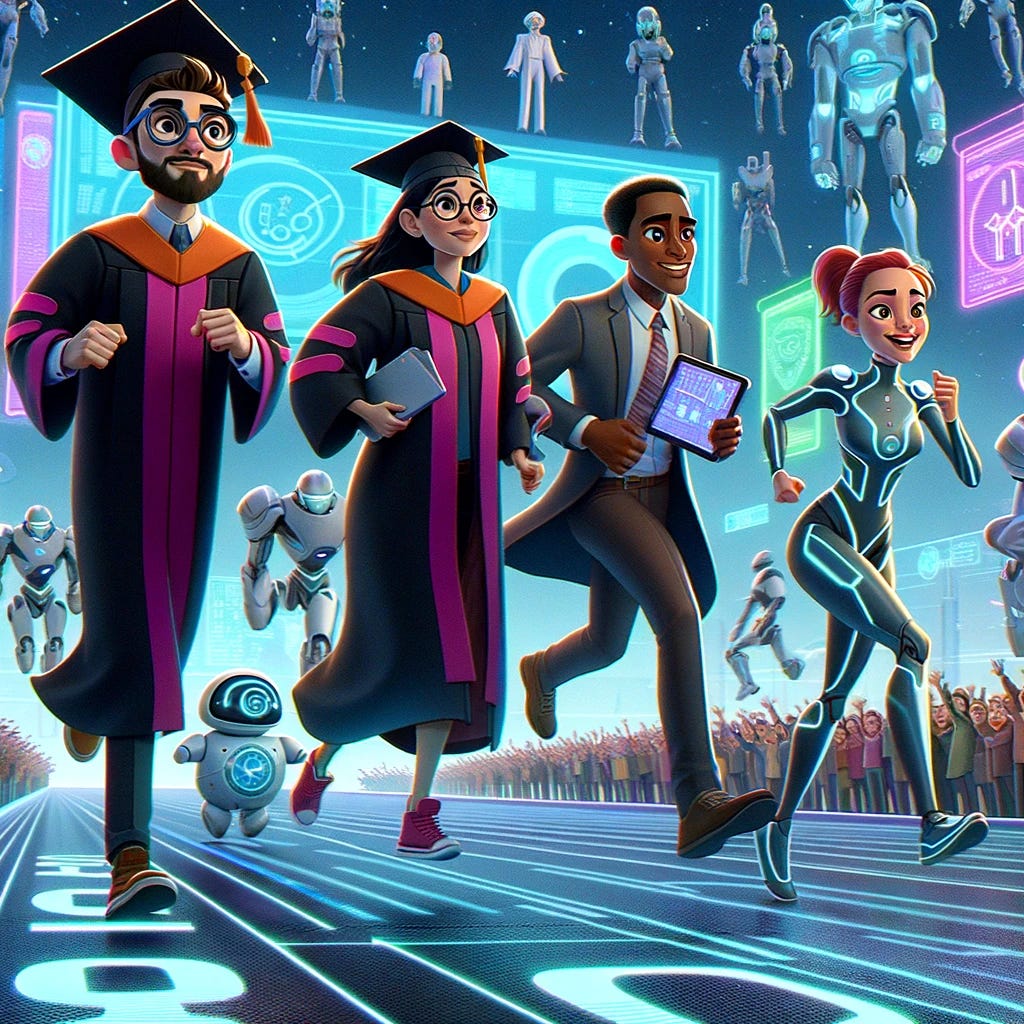Relationships and learning in the "AI Boom"
We learn with and through others, we risk losing sight of that fact in the age of the "AI tutor"
We are social beings. We intrinsincly and intuitively know this. Humans, and especially human brains, have evolved to anticipate and flourish off human connection. In the rising clamour to “improve” education we often lose sight of that fact and end up focusing only on make education more efficient.
Human relationships are messy by design and are key to any kind of meaningful and impactful learning. We will need these relationships more in the future - not less.
In this edition, I sit down with Isabelle Hau, the Director of Stanford’s Learning Accelerator to get her views on the above and more.
I first met Isabelle when she was a fellow judge for the learning pillar at MIT’s Solve Prize. I was immediately struck by her ability to think deeply and engage with a diverse set of problems around learning and education.
Isabelle brings almost two decades of experience investing in some of the most impactful education initiatives around the world. She now leads Stanford’s Learning Accelerator where she is tackling some of the hardest learning challenges with quite a diverse tool set.
(The interview has been edited for clarity)
Tell us more about the Stanford Accelerator for Learning? What are you trying to achieve?
Our mission centers on developing research-based solutions that effectively bridge the gap between academic research and its practical application.
One avenue of our work looks at leveraging technology to revolutionize brain science and learning.This work is crucial in academia, where the emphasis traditionally leans more towards research than real-world implementation.
Our initiatives span a lifetime of learning, beginning in early childhood and extending throughout an individual's life. This comprehensive approach is vital as it integrates diverse disciplines such as education, neuroscience, medicine, business, and psychology.
We are particularly focused on how AI can enhance collaboration and creativity among learners of all ages. For instance, we are exploring how AI agents could facilitate collaborative learning in classrooms.
One of our exciting new projects is an AI Tinkery. This initiative builds on Stanford's longstanding excellence in AI, a field we have been pioneers in since the 1950s when the term "AI" was first coined here. It is designed as a physical sandbox to foster exploration and innovation where various partners and stakeholders can come together to experiment and innovate with AI technologies.
It’s important to emphasize that our efforts at the Accelerator are not just about advancing technology but about redefining the educational landscape to foster a lifelong, collaborative, and creative learning journey.
How did you get involved in education and AI?
I began my career in finance, and about 15 years ago, I ventured into education.
This transition was part of my journey into impact investing where I started to blend finance with educational initiatives. My shift towards education was driven by my conviction that education is the most crucial catalyst for individual and societal change.
This belief steered my decade-long tenure at the Omidyar Network and later led to the spin-off of Imaginable Futures. In both roles, I spearheaded investments in global educational companies, focusing on innovation in the sector.
My work has always centered on identifying, partnering with, and supporting remarkable organizations in the educational space to amplify their impact. Now, I continue to advance this mission with a keen focus on the intersection of innovation and research.
AI has been a significant component of my strategic thinking, influencing some of the pivotal investments I made while at the Omidyar Network, even before the surge of Generative AI.
Of course, the past 18 months have seen an explosive growth in this area, reflecting the increasing integration of Generative AI tools in educational strategies to enhance learning outcomes and operational efficiencies.
How does your role today differ from your previous role on the venture investment side?
My role today at the Stanford Learning Accelerator is distinctly more research-focused compared to my previous venture investment-focused position.
The biggest similarity between my previous roles lies in the similarity between founders and professors. Both groups share an obsession with solving specific problems and a belief that solving that one problem will change the world.
In contrast, at the Stanford Learning Accelerator, the pathways for scale are much more varied than they were at the Omidyar Network - which was primarily concerned with scaling early stage organizations.
Our focus now extends beyond just scaling organizations; we aim to scale different research ideas across various channels. This shift from scaling individual entities to broadening the impact of knowledge and ideas marks a substantial change in how I approach my work.
It's not just about growth in the conventional sense but about disseminating transformative ideas that can have a wide-reaching effect on the field of education and beyond.
What are you spending your time thinking about most these days?
I’m focused on three big themes today.
First, most AI solutions currently focus primarily on efficiency. While efficiency in education is crucial, it's not enough just to make systems more efficient—we need to make them genuinely better for learners, educators and families.
This requires paradigm shifts that prioritize improving educational systems rather than merely streamlining them. I often wonder if we are leveraging this wave of innovation to its fullest potential or if we are merely caught in the trojan horse of efficiency.
Second, I am absolutely fascinated by how human relationships are evolving in a world increasingly powered by technology. As humans, we find ourselves increasingly blurred on the distinctions between what is human and what is machine. This area not only holds tremendous positive potential but also raises obvious serious concerns about the roles of machines, bots, and agents in our lives.
Finally, I spend a lot of time thinking about learning differences—a new field for me. We have a significant practice focused on this issue in my current role. It's astounding to observe what's happening globally with learning differences like dyslexia and ADHD, which are reportedly on the rise.
This shift is bringing these challenges to the forefront, emphasizing the concept of neurodiversity and underscoring the importance of personalization in our educational approaches.
In many ways, it seems that the biggest bottlenecks in improving learning once we’ve figured out access, lie in motivation and assessment. Do you agree with that? What’s missing from that paradigm?
You're right to point out that motivation and assessment are significant bottlenecks in enhancing learning once access issues are resolved. However, I believe engagement deserves distinct consideration because it encompasses both belonging and motivation.
Belonging is often overlooked in educational discussions, yet it's critical. For instance, it's quite shocking that 70% of high school students in the US report hating school. While some may dismiss this as typical teenage rebellion, it prompts a serious question: why are our youth so disconnected from existing educational systems?
The increasing shift towards homeschooling and alternative education solutions indicates a deep-seated dissatisfaction that needs to be addressed urgently.
On the topic of assessment, I'm optimistic yet surprised by the slow pace of change. We need to move towards assessments that are invisible and formative, where the act of testing is separated from the concepts of assessment and learning. High-stakes exams should be rethought to incorporate continuous formative feedback, to be less intrusive and more reflective of continuous learning.
Moreover, I've experienced firsthand the power of purpose and real-world application in learning through a class I co-taught recently with the Stanford d.school. We tasked students with identifying real community problems and developing prototypes to address them. Although the requirement was to conduct just two interviews, the students conducted fifteen on average, driven by their engagement with “authentic challenges”.
It's clear that integrating real-world problem solving and promoting group-based learning are crucial elements to creating resonant learning environments.
You are working on a new book, what can you tell us about it?
I'm very excited to be nearing the completion of my manuscript for a new book, tentatively titled "Love to Learn."
This book explores two critical dimensions of learning. Firstly, it emphasizes the importance of love and strong relationships in the learning process—we learn with and through others. Secondly, it delves into the necessity of fostering a lifelong love for learning, especially given the rapid pace of change in our world.
In the book, I go deep into the science of relationships and the cutting-edge knowledge about our social brains. The more we understand about how our brains function, the clearer it becomes that we are inherently social beings.
Another major theme of the book addresses the societal shifts where our social circles are increasingly narrowing, leading to greater isolation—changes driven by various societal and technological factors.
This isolation is contributing to what I describe as a “relational deprivation crisis”, significantly impacting our capacity to thrive and grow. Worryingly, we are seeing data across multiple countries indicating that IQ levels, which had been steadily increasing, have begun to show signs of deterioration in recent years. I argue that this decline is linked to our species becoming less social.
The book is set to go live in early 2025, and I aim to provide insights and solutions to these pressing issues.
Through my book, I’m hoping to foster a deeper understanding of the importance of relationships in learning and personal development.
I hope you enjoyed the last edition of Nafez’s Notes.
I’m constantly refining my personal thesis on innovation in learning and education. Please do reach out if you have any thoughts on learning - especially as it relates to my favorite problems.
If you are building a startup in the learning space and taking a pedagogy-first approach - I’d love to hear from you.
Finally, if you are new here you might also enjoy some of my most popular pieces:
The Gameboy instead of the Metaverse of Education - An attempt to emphasize the importance of modifying the learning process itself as opposed to the technology we are using.
Using First Principles to Push Past the Hype in Edtech - A call to ground all attempts at innovating in edtech in first principles and move beyond the hype
We knew it was broken. Now we might just have to fix it - An optimistic view on how generative AI will transform education by creating “lower floors and higher ceilings”.






